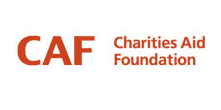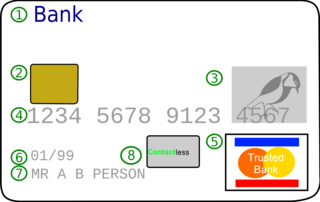Related Research Articles

A debit card, also known as a check card or bank card is a payment card that can be used in place of cash to make purchases. The term plastic card includes the above and as an identity document. These are similar to a credit card, but unlike a credit card, the money for the purchase must be in the cardholder's bank account at the time of a purchase and is immediately transferred directly from that account to the merchant's account to pay for the purchase.

A charitable trust is an irrevocable trust established for charitable purposes and, in some jurisdictions, a more specific term than "charitable organization". A charitable trust enjoys a varying degree of tax benefits in most countries. It also generates good will. Some important terminology in charitable trusts is the term "corpus", which refers to the assets with which the trust is funded, and the term "donor", which is the person donating assets to a charity.

The United States Patent and Trademark Office (USPTO) is an agency in the U.S. Department of Commerce that serves as the national patent office and trademark registration authority for the United States. The USPTO's headquarters are in Alexandria, Virginia, after a 2005 move from the Crystal City area of neighboring Arlington, Virginia.

A scrip is any substitute for legal tender. It is often a form of credit. Scrips have been created and used for a variety of reasons, including exploitive payment of employees under truck systems; or for use in local commerce at times when regular currency was unavailable, for example in remote coal towns, military bases, ships on long voyages, or occupied countries in wartime. Besides company scrip, other forms of scrip include land scrip, vouchers, token coins such as subway tokens, IOUs, arcade tokens and tickets, and points on some credit cards.

A gift card also known as gift certificate in North America, or gift voucher or gift token in the UK is a prepaid stored-value money card, usually issued by a retailer or bank, to be used as an alternative to cash for purchases within a particular store or related businesses. Gift cards are also given out by employers or organizations as rewards or gifts. They may also be distributed by retailers and marketers as part of a promotion strategy, to entice the recipient to come in or return to the store, and at times such cards are called cash cards. Gift cards are generally redeemable only for purchases at the relevant retail premises and cannot be cashed out, and in some situations may be subject to an expiry date or fees. American Express, MasterCard, and Visa offer generic gift cards which need not be redeemed at particular stores, and which are widely used for cashback marketing strategies. A feature of these cards is that they are generally anonymous and are disposed of when the stored value on a card is exhausted.

Fundraising or fund-raising is the process of seeking and gathering voluntary financial contributions by engaging individuals, businesses, charitable foundations, or governmental agencies. Although fundraising typically refers to efforts to gather money for non-profit organizations, it is sometimes used to refer to the identification and solicitation of investors or other sources of capital for for-profit enterprises.

A greeting card is a piece of card stock, usually with an illustration or photo, made of high quality paper featuring an expression of friendship or other sentiment. Although greeting cards are usually given on special occasions such as birthdays, Christmas or other holidays, such as Halloween, they are also sent to convey thanks or express other feelings.

A financial endowment is a legal structure for managing, and in many cases indefinitely perpetuating, a pool of financial, real estate, or other investments for a specific purpose according to the will of its founders and donors. Endowments are often structured so that the inflation-adjusted principal or "corpus" value is kept intact, while a portion of the fund can be spent each year, utilizing a prudent spending policy.
Under United States law, a patent is a right granted to the inventor of a (1) process, machine, article of manufacture, or composition of matter, (2) that is new, useful, and non-obvious. A patent is the right to exclude others, for a limited time from profiting of a patented technology without the consent of the patent-holder. Specifically, it is the right to exclude others from: making, using, selling, offering for sale, importing, inducing others to infringe, applying for an FDA approval, and/or offering a product specially adapted for practice of the patent.
Coinstar, LLC is an American company operating coin-cashing machines.
In the United States, a donor-advised fund is a charitable giving vehicle administered by a public charity created to manage charitable donations on behalf of organizations, families, or individuals. To participate in a donor-advised fund, a donating individual or organization opens an account in the fund and deposits cash, securities, or other financial instruments. They surrender ownership of anything they put in the fund, but retain advisory privileges over how their account is invested, and how it distributes money to charities.

Payment cards are part of a payment system issued by financial institutions, such as a bank, to a customer that enables its owner to access the funds in the customer's designated bank accounts, or through a credit account and make payments by electronic transfer and access automated teller machines (ATMs). Such cards are known by a variety of names including bank cards, ATM cards, client cards, key cards or cash cards.

The Charities Aid Foundation (CAF) is a registered UK charity that operates in the United Kingdom, the United States of America and Canada. It works with companies, private philanthropists, regular donors, fellow foundations, governments, charities and not-for-profit enterprises to enable them to give more. Its stated purpose is to “accelerate progress in society towards a fair and sustainable future for all.”

A poker run is an organized event in which participants, usually using motorcycles, all-terrain vehicles, boats, snowmobiles, horses, on foot or other means of transportation, must visit five to seven checkpoints, drawing a playing card at each one. The object is to have the best poker hand at the end of the run. Having the best hand and winning is purely a matter of chance. The event has a time limit, however the individual participants are not timed.
A donor managed investment account is a charitable giving mechanism in which donors receive a full tax deduction at the time they fund the DMI account, but retain investment management rights over the account, and can request donations from the account to charities.

Alternative giving is a form of gift giving in which the giver makes a donation to a charitable organization on the gift recipient’s behalf, rather than giving them an item. The idea of giving something to one person by paying another was applied by Benjamin Franklin as a "trick ... for doing a deal of good with a little money", which came to be known as "pay it forward". This form of giving is often used as an alternative to consumerism and to mitigate the impact of gift-giving on the environment.

Mishloach manot, or shalech mones, and also called a Purim basket, are gifts of food or drink that are sent to family, friends and others on Purim day. The mitzvah of giving mishloach manot derives from the Book of Esther. It is meant to ensure that everyone has enough food for the Purim feast held later in the day, and to increase love and friendship among Jews and their neighbors.

A credit card is a payment card issued to users (cardholders) to enable the cardholder to pay a merchant for goods and services based on the cardholder's accrued debt. The card issuer creates a revolving account and grants a line of credit to the cardholder, from which the cardholder can borrow money for payment to a merchant or as a cash advance. There are two credit card groups: consumer credit cards and business credit cards. Most cards are plastic, but some are metal cards, and a few gemstone-encrusted metal cards.
National Philanthropic Trust (NPT) is an American independent public charity that provides philanthropic expertise to donors, foundations and financial institutions. NPT ranks among the largest grantmaking institutions in the United States.
GlobalGiving is 501(c)(3) non-profit organization based in the United States that provides a global crowdfunding platform for grassroots charitable projects. Since 2002, more than 1.6 million donors on GlobalGiving have donated more than $750 million to support more than 33,000 projects in 175 countries.
References
- ↑ 'The Times' 28Nov1989 p34
- ↑ Archive index at the Wayback Machine
- ↑ Archive index at the Wayback Machine
- ↑ Archive index at the Wayback Machine
- ↑ Scroogenomics, Joel Wladfogel, Princeton University Press 2009
- ↑ The Five Best Gift Cards Accessed 09Dec2009
- ↑ "USPTO Patent 659,573". Archived from the original on 2013-04-09. Retrieved 2009-12-28.
- ↑ Archive index at the Wayback Machine
- ↑ In United Kingdom see charity vouchers; in Australia see karmacurrency; in Canada see canadahelps
- ↑ Memorial Cards